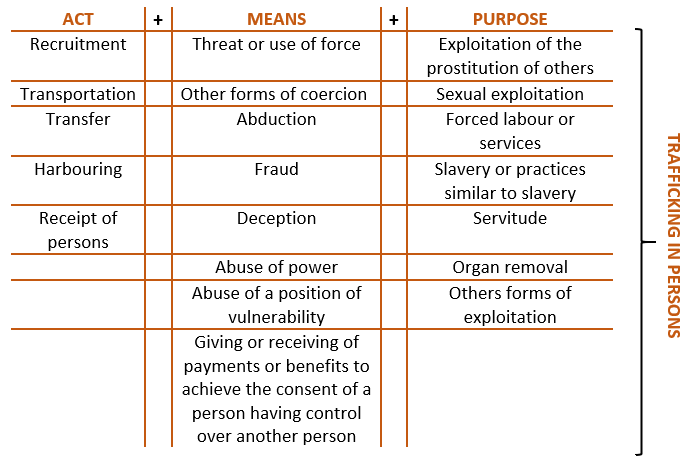Module 1 addresses the international definition of smuggling of migrants, while Module 6 is dedicated to the international definition of trafficking. Below is a summary of the main concepts analysed in these two Modules.
Smuggling of migrants is defined in article 3 of the Protocol against the Smuggling of Migrants by Land, Sea and Air (Protocol against the Smuggling of Migrants).
|
(…) the procurement, in order to obtain, directly or indirectly, a financial or other material benefit, of the illegal entry of a person into a State Party of which the person is not a national or a permanent resident. |
The Protocol against the Smuggling of Migrants criminalizes not only smuggling of migrants - that is, the facilitation of illegal entry for profit - but also related conduct. This includes enabling of illegal stay by any illegal means, as well as producing, procuring, providing or possessing a fraudulent document to enable the smuggling of migrants. Each of these offences are prescribed in article 6 of the Protocol.
Article 6 of the Protocol against the Smuggling of Migrants1 . Each State Party shall adopt such legislative and other measures as may be necessary to establish as criminal offences, when committed intentionally and in order to obtain, directly or indirectly, a financial or other material benefit: (a) The smuggling of migrants; (b) When committed for the purpose of enabling the smuggling of migrants: (i) Producing a fraudulent travel or identity document; (ii) Procuring, providing or possessing such a document;
(c) Enabling a person who is not a national or a permanent resident to remain in the State concerned without complying with the necessary requirements for legally remaining in the State by the means mentioned in subparagraph (b) of this paragraph or any other illegal means. (…)
|
Trafficking in persons is defined in article 3 of the Protocol to Prevent, Suppress and Punish Trafficking in Persons, Especially Women and Children (Protocol against Trafficking in Persons), supplementing the United Nations Convention against Transnational Organized Crime. The offence of trafficking in prescribed in article 5 of the Protocol.
Article 3 of the Protocol against Trafficking in Persons(a) "Trafficking in persons" shall mean the recruitment, transportation, transfer, harbouring or receipt of persons, by means of the threat or use of force or other forms of coercion, of abduction, of fraud, of deception, of the abuse of power or of a position of vulnerability or of the giving or receiving of payments or benefits to achieve the consent of a person having control over another person, for the purpose of exploitation. Exploitation shall include, at a minimum, the exploitation of the prostitution of others or other forms of sexual exploitation, forced labour or services, slavery or practices similar to slavery, servitude or the removal of organs; (b) The consent of a victim of trafficking in persons to the intended exploitation set forth in subparagraph (a) of this article shall be irrelevant where any of the means set forth in subparagraph (a) have been used; (c) The recruitment, transportation, transfer, harbouring or receipt of a child for the purpose of exploitation shall be considered "trafficking in persons" even if this does not involve any of the means set forth in subparagraph (a) of this article; (d) "Child" shall mean any person under eighteen years of age. |

Importantly, where the victim of trafficking is a child the crime does not require proof of the "means" element. A combination of the "act" and "purpose" elements outlined above constitute trafficking in children.